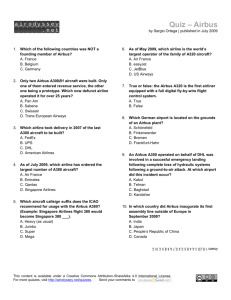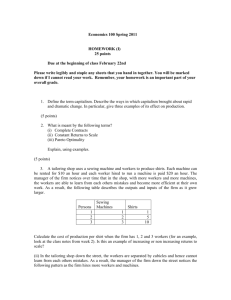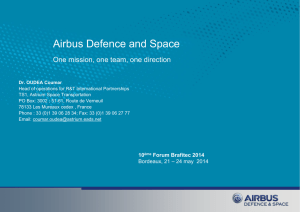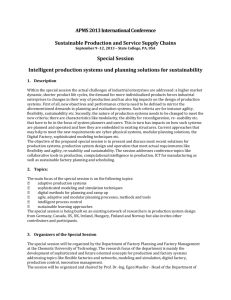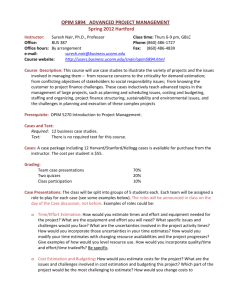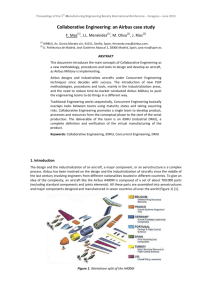Publishable Summary
advertisement
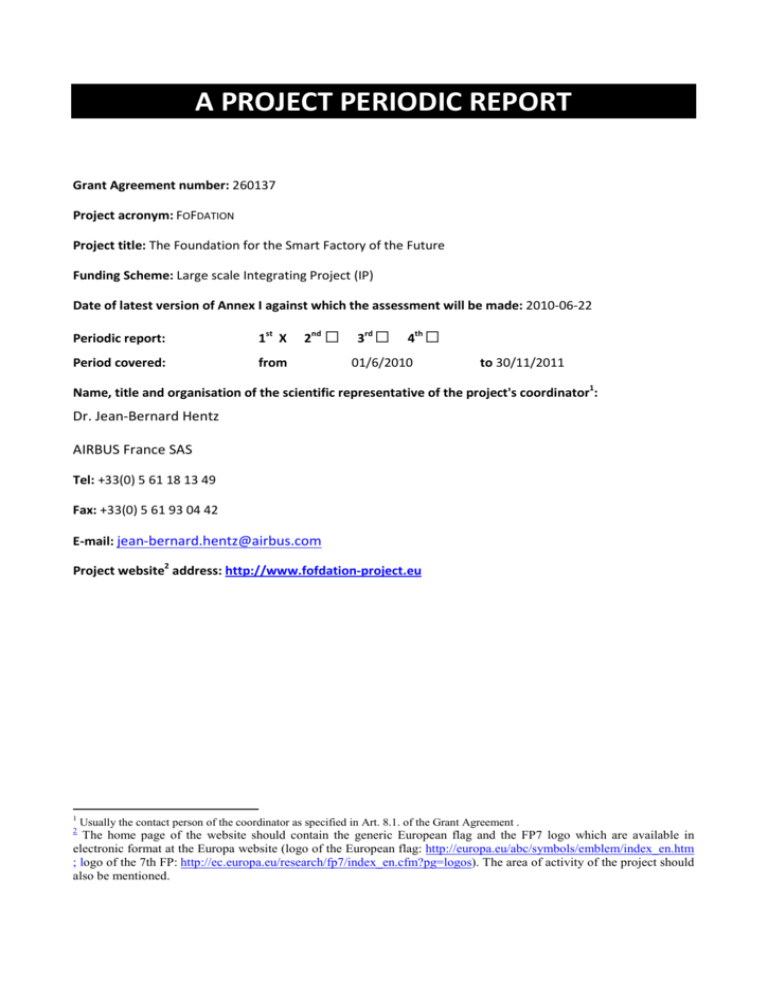
A PROJECT PERIODIC REPORT Grant Agreement number: 260137 Project acronym: FOFDATION Project title: The Foundation for the Smart Factory of the Future Funding Scheme: Large scale Integrating Project (IP) Date of latest version of Annex I against which the assessment will be made: 2010-06-22 Periodic report: 1st X Period covered: from 2nd □ 3rd □ 4th 01/6/2010 □ to 30/11/2011 Name, title and organisation of the scientific representative of the project's coordinator1: Dr. Jean-Bernard Hentz AIRBUS France SAS Tel: +33(0) 5 61 18 13 49 Fax: +33(0) 5 61 93 04 42 E-mail: jean-bernard.hentz@airbus.com Project website2 address: http://www.fofdation-project.eu 1 2 Usually the contact person of the coordinator as specified in Art. 8.1. of the Grant Agreement . The home page of the website should contain the generic European flag and the FP7 logo which are available in electronic format at the Europa website (logo of the European flag: http://europa.eu/abc/symbols/emblem/index_en.htm ; logo of the 7th FP: http://ec.europa.eu/research/fp7/index_en.cfm?pg=logos). The area of activity of the project should also be mentioned. Publishable summary Problem statement Today’s major challenges for manufacturing companies in the aerospace and automotive industries are clear: global cooperation with multiple supply chain partners, production optimisation, management and tracking of information so as to meet new requirements in terms of traceability, security and sustainability. Currently, in the factory, dynamic changes caused by internal and external turbulences like a machine breakdown or an order fluctuation might not be taken into account because of multiple non-compatible information systems and lack of data interoperability and integration. In order to enable management to make the right decisions, real-time visibility throughout the whole manufacturing process and the direct implementation of decisions are indispensable. Currently, the factory manufacturing control and management still rely on disparate systems: • Product Lifecycle Management (PLM) for innovation and product development • Shop floor planning and programming system for the allocation of NC jobs and machine-tools • And a multitude of middleware applications and Enterprise Resource Planning systems (ERP) to synchronize the information between the internal and external worlds at the management level. The management of the multiple processes inside and outside of the factory in the increasingly volatile economy requires complex and flexible manufacturing sequences which are difficult to realize with today’s solutions, of which outdated data can lead to problems in planning and production as well as corporate image. What are the FoFdation objectives? The four-year project titled FoFdation envisions a “Digital and Smart Factory” architecture and implementation. This has the potential to achieve significant benefits in earlier visibility of manufacturing issues, faster production ramp-up time, faster time to volume production and subsequently shorter time to market, reduced manufacturing costs and improved product quality, as well as sustainability objectives like low energy consumption and waste reduction. These benefits will be achieved by meeting the five objectives which jointly compose the foundation of the “Factory of the Future”: 1. End-to-end digitization of the product, process and machine resources. This advanced information will enable the development of three vertical application pillars : 2. Development of a “Smart Machine Controller” (SMC) concept, including an extended “Supervisory Control and Acquisition Data System” for monitoring the process performance and the energy efficiency. 3. Realization of a ‘Smart Manufacturing Optimizer’ (SMO) using the virtual product information from CAD/PLM and the real machine and on-line process information to adapt process control information to achieve optimal process results. 4. Extension of MES systems to a ‘Smart Manufacturing Execution System’ (SMES) by supporting resource efficiency and sustainability goals and communication relevant manufacturing operations data to ‘Enterprise Resource Planning’ (ERP) systems 5. The three application pillars will deliver the manufacturing performance indicators into a common compilation dashboard which allows the integrated monitoring of “production-to-enterprise” asset and overall sustainability management. In short, the project will extend existing information processing systems by enriching information about product data, machine tools, tools and processes and process monitoring information fed back to the overall manufacturing information systems. 2 The project will deliver: (a) a proof-of-concept Smart Factory based on an open-architecture foundation allowing the demonstration for selected user case study scenarios providing an instantiation of the generic and standards-oriented framework together with (b) a technology exploitation model supported by a living-lab infrastructure covering the complete product-manufacturing lifecycle. ...Meet major European industry expectations Fiat Automotive Use Case: towards integrated quality energy efficiency Production Processes Fiat commitment is to pursue a development in harmony with the environment and people, essential for long-term growth, and to continuously improving its sustainability performance. Fiat Center of Research (CRF) is asked to envision a Manufacturing Information System (M.I.S.) framework in order to manage production scheduling, sequencing with respect to the demands (customers’ requests) and the machines capacity and availability. Both productivity and sustainability issues must be harmoniously addressed. Airbus UC1: develop high-quality subcontracting (zero-defect, productive, sustainable...) As a leading aerospace manufacturer, Airbus wants to improve production its profitability by streamlining the manufacturing process with its global subcontractors (SCM). The company expects to implement an integrated manufacturing information pipeline (MIP) that can describe and access to all the resources of the extended manufacturing including those of the contractor partners. This use case mainly addresses the vertical integration issue: interoperability and fine-tuning of manufacturing data in a NC machining workcell as per developed by FoFdation. Specifications of an advanced HMI and training materials are expected to promote and disseminate the FoFdation product and process. Airbus UC2: towards a holistic IT environment to sustain an extended and sustainable enterprise This includes Airbus Use Case 1 in an Extended and Sustainable Enterprise environment with its IT flow and integration mechanisms that are parts of FoFdation specifications (ERP/MES/PLM integration…) Airbus Use Case 2 aims at taking opportunities 3 for cost-asset savings and for driving the corporate Bottom-Line strategies through a horizontal integration planning and holistic awareness: • Document control • Cost control • Tool and gage management • Tracking manufacturing events and non conformances • Real time energy & waste consumption, etc… What makes FoFdation “unique”? - On the one hand, unlike many other projects, FoFdation doesn’t propose a top-down but a bottom-up approach: in FoFdation we would rather investigate the fundamental digitization issue and the semantic data content for interoperability than the only data connectivity aspect. The real issue is to enrich the analytic information at the shopfloor (machine-tool) level towards a holistic manufacturing optimization and visibility. Pre-defining what information can be exchanged between applications (the data model) implies that the type of information that needs to be shared is fixed. This is never the case in a dynamic business environment. What is more important is defining how applications can interoperate! - On the other hand, FoFdation aims at enabling pragmatic industrial innovation determined by three fundamental guidelines: Evolution based on sustaining innovation towards cost-effective investment: to support the recovery of SMEs which are particularly affected by the economic downturn, we expect within FoFdation to implement advanced manufacturing concepts in their existing environment and beside their legacy brand-name equipments (e.g. machines and controllers), thus significantly contributing towards their global competitiveness in short and medium term. A solution (products-services) should be delivered at the end of the project Revolution based on disruptive innovation: As a R&D project, FoFdation must envision breakthrough technology towards the delivery of a prototypical manufacturing system that can demonstrate new concepts even based on paradigm shift, thus facilitating innovation-to-industrialization path in Europe. A « lab prototype » based on an open platform and a living FabLAB infrastructure should be proposed to support demonstration and learning beyond the project duration. “Don’t reinvent the wheel!” against “Versus the State of the Play”: Our FoFdation outcomes benefit from existing « prerequisites » developed by the partners or hi-tech products-software in the market. FOFdation is expected to define a unified and open IT architecture at the shopfloor level in order to enable both sustaining and breakthrough innovations for industry: - Sustaining innovation is based on additional components compatible with legacy systems, thus supporting the industry progressive transformation by introducing more IT assisted technology into conventional and existing manufacturing process for better optimization of the manufacturing process. Within the recovery context, the SMC architecture must be compatible with legacy “brand name NC” controllers. This condition is necessary to support the transformation of prevalent brand name controllers mostly based on ISO G&M code into Step-NC compliant controllers, thus allowing companies to increase their production performance without heavily investing in new expensive machines and time-consuming training. This “Legacy Use Case” will be based on a Step-NC remote SMC interface for part 4 - programming tightly integrated with the optimization module (SMO) and running on a dedicated Windows PC. Breakthrough innovation is based on paradigm shift and science-based integration. With FOFdation we envision the next numerical controller smarter and able to be self-adaptive with regard to the real status of the machining process. It must be able to generate itself the cutter path and optimize the cutting strategy in real-time. In order to encourage synergy and to easily benefit from a large research community’s contribution, an Open-source controller based on Linux will be developed. It will be proposed with an embedded Step-NC Windows-based SMC interface (HMI) including its own tool-path generator, e.g. for surface milling. This will be the prototypical Step-NC compliant Controller fully compatible with the SMO system. Together within FoFdation, we have achieved so far... • Analysis of the state of the art FoFdation scope (academic partners, ISO technical Machine-tool optimization & Manufacturing visibility groups...) and the state of the play (industrial partners, end-users). The le v e use-cases are precisely described l si Management level sy Entreprise M anag ement according to Airbus and CR-Fiat la (asset, resource,supply,…) n requirements (WP1) a g WP6 n • Specifications and roadmap for riu Production Planning tc Factory-engineering leve l FoFdation development and WP5 af Macroplanning u implementation (WP2) n a WP4 M • The definition of our new controller Microplanning Field level WP3 architecture and even more its Process Control realization as well as the new HMI m-seconds seconds hours days software integration (WP3) Temporal decision scale • The preliminary definition of the scope of the optimization process as well as its architecture and the key dynamic parameters (WP4). • The preliminary definition of the scope of sustainability monitoring (WP5). ...to revolutionize the ways in which manufacturing industry interact with resources through the use of cutting-edge, digital technology: - Equipment: better usage of machine-tools productivity: + 30% - Supply Chain: better visibility and control cost reduction: - 30% - Environment: better monitoring of resources (waste & energy) e.g. energy consumption: -30% - Societal: moreover, FOFdation will enable new business trends towards open technology platforms and products-services integration, thus bringing positive impacts on SMEs productivity and their competitiveness in the global economy while supporting established European brand-names to adopt new business models with the “open and sustainable technology environment”. 5




